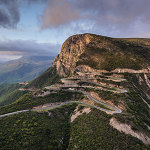In American media, Sierra Leone has been scrutinized to great lengths and in turn, has led to a very poor reputation amongst American people. A major factor that has influence American’s beliefs of Sierra Leone was award-winning film Blood Diamond. This movie portrays a country torn apart by the struggle between government loyalists and insurgent forces and many of the atrocities of that war. Blood diamonds are diamonds mined in African war zones and sold to finance conflicts, and thereby profit warlords and diamond companies across the world. This has put an image into the people’s minds of Sierra Leone being a place filled with poverty, destruction and hate. This is all that media has allowed to be seared into the minds of people, along with almost entirely negative stories about the struggles of Sierra Leone and other African countries.
However, this image does not do Sierra Leone its proper justice. Sierra Leone is filled with prosperity in many different forms. The small country is rich with gems and minerals, specifically diamonds. The export of these minerals accounts for about 78 % of the countries revenue with diamonds making up about 46 % alone. Along with the large amount of diamonds in Sierra Leone, there is also vast deposits of rutile, bauxite, gold, iron and limonite. Even though Sierra Leone is a very small country in size it is still one of the top ten producers of diamonds worldwide and top five for rutile.
Sierra Leone is still recovering from a very recent civil war which was due mostly to illicit diamond trading. The country is still recovering from this event, with a great deal of the diamonds mined being smuggled out of the country illegally or sold through corrupt individual officials, thus only creating profit for themselves. Several years down the road, the Sierra Leone government will be able to put policies in place preventing this movement thus creating an even larger revenue from the mining of their natural resources.
Sierra Leone, along with its mineral and diamond wealth, is rich in ethnic diversity. The country is made up of 16 major ethnic groups. The largest and most influential group is the Temne people followed by the Mende. These two groups make up about 2/3 of the total population in Sierra Leone. The other groups make up small portions of the remaining population. All these people interact reasonably and peacefully with one another, with most holding strong ties with select others. Along with ethnic diversity, Sierra Leone also has religious diversity. Large groups of Muslims and Christians make up the majority of the population. These two groups both have large subgroups that practice a syncretic mixture of their belief with traditional indigenous beliefs. There is an organization in Sierra Leone named the Sierra Leone Inter-Religious Council, which is made up of both Christian and Muslim religious leaders who promote peace and tolerance throughout the country. Because of this there is very little religious conflict, causing Sierra Leone to be regarded as one of the most religiously tolerant nations in the world.
When it comes to children, much work is being done to improve the lives of many of the Sierra Leonean children. One of the leading organization is the Craig Bellamy Foundation, a charity that offers underprivileged children in Sierra Leone the chance to reach their true potential through sport and education, enabling them to build a better life for themselves and their communities. The CBF League was launched in 2009 with support from UNICEF. Using football to empower a new generation to bring about positive change they focus on increasing school attendance and respect for fair play, while delivering community development projects. Involving more than 2,000 boys and girls around the country the CBF League is having a considerable impact.
While all people in America hear about is poverty and war, Sierra Leone is much more than just the negative. An accepting country, working every day to better the lives of the people.






 -Angola beautiful beaches
-Angola beautiful beaches













